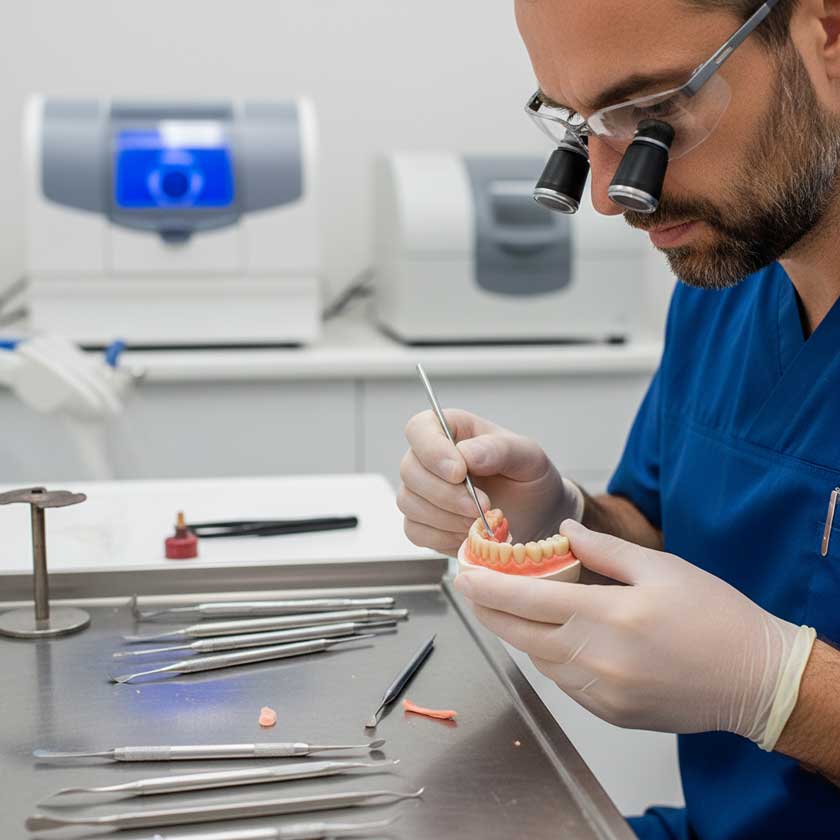One significant concern for many individuals wearing dentures is how it will affect their speech. It is not uncommon for denture wearers to experience challenges with pronunciation, clarity, or overall speech quality.
If you struggle with speaking clearly with dentures, know you are not alone. You can practice specific techniques and exercises to improve your denture speech and easily communicate. We'll give you important tips for speaking confidently with dentures and overcoming speech challenges.
Key Takeaways
- Wearing dentures can have an impact on speech clarity and pronunciation.
- Understanding the challenges of denture speech is the first step in improving your communication skills.
- Techniques such as tongue exercises, jaw movements, and palate therapy can help enhance speech clarity with dentures.
- Building confidence and practicing effective communication strategies is critical to speaking clearly with dentures.
- With persistence and practice, you can overcome speech challenges and communicate clearly with dentures.

Understanding the challenges of denture speech.
Wearing dentures can sometimes lead to speech issues, which is frustrating for many denture wearers. Dentures can cause speech problems like slurring, mumbling, garbling, unclear speech, lisping, sibilant speech, hissing, and whistling.
There are various reasons why these problems can occur. One reason is the fit of the dentures. Another reason is the shape of the mouth. The positioning of the tongue, jaw, and lips can also contribute to these problems.
Fortunately, several solutions are available to help denture wearers overcome speech difficulties. One of the most effective options is denture speech therapy. This therapy helps people with dentures improve their speech and overcome speech problems caused by dentures.
Speech therapy can improve tongue movement, jaw control, lip coordination, and dental care. By practicing these techniques regularly, individuals can gradually improve their denture speech and achieve more transparent communication.
Use adhesive to secure dentures, speak slowly, and pronounce words to improve denture speech. Individuals with dentures can overcome speech challenges and confidently communicate with patience, practice, and these helpful tips.
Techniques to improve denture speech.
Getting used to talking with dentures may take time, but you can improve your speech with dentures. Here are some tips and tricks:
Tongue position and movements.
Proper tongue position is important for clear speech with dentures. You can start by placing the tip of your tongue behind your upper front teeth and pressing it against your palate while speaking. Proper tongue position helps to create a seal and prevent air leakage, which can lead to a lisp or other speech issues.
You can try various tongue exercises. For example, you can tap your tongue on different parts of your mouth or move it from side to side. Additionally, you can practice specific sounds that require tongue movements. These exercises can strengthen your tongue muscles and improve your control and coordination.
Palate exercises
The shape and size of your palate can affect your denture speech. Palate exercises can help you become more familiar with your palate and improve your speech.
To do this exercise:
- Place a spoon on your tongue.
- Press the spoon against the roof of your mouth.
- Slide the spoon towards your throat. This exercise can help your palate adjust to your dentures.
Jaw control and movements.
Proper jaw control can also improve your denture speech. You can start by practicing opening and closing your jaw in a slow and controlled manner while speaking. Proper jaw control can help you adjust to the feeling of your dentures and improve your stability and coordination.
Exercise your jaw muscles by clenching and holding it for a few seconds before releasing it. Pushing your tongue to the roof of your mouth while clenching can help activate your jaw muscles and improve your strength.
Lip control and coordination.
Your lips play an important role in forming certain sounds when speaking. Try pouting, blowing air kisses, and stretching your lips into a smile to improve your lip muscles and coordination. These exercises will help strengthen your lips and improve control.
Practicing these exercises and techniques daily can enhance your ability to speak with dentures. Practicing will boost your confidence while communicating.
Tips for confident communication with dentures.
If you're struggling with denture speech, don't worry – plenty of tips and techniques can help you speak with clarity and confidence. Here are some essential tips for improving your denture speech:
- Practice, practice, practice: The more you practice speaking with dentures, the more comfortable and confident you'll become. Try reading aloud each day to improve your pronunciation and diction.
- Speak slowly and clearly: Take your time when speaking and focus on enunciating each word. This will give you time to adjust to your dentures and ensure your speech is easily understood.
- If you struggle with saying words, use diagrams or videos to learn how to pronounce them correctly.
- If you have trouble speaking with dentures, see a speech therapist specializing in helping denture wearers. They can provide specific exercises and techniques to help you overcome any speech challenges.
- Try denture adhesives to speak better by keeping your dentures in place securely. Try different types of adhesives to see what works best for you.
Remember, clear and confident communication with dentures takes time and practice. Be patient with yourself and keep working at it – you'll get there!
Persistence and practice are key to mastering clear denture speech.
With the proper techniques and regular practice, speaking clearly with dentures is achievable. Understanding the challenges and addressing any speech impediments that may arise is essential. Remember to incorporate specific tongue and jaw control exercises, practice palate exercises, and work on lip coordination.
Build confidence by communicating with friends and family and seeking professional assistance. Remember that mastering denture speech is a journey, but keep going even if progress seems slow. With persistence, you can accomplish it.
FAQ
How can denture wearers improve their speech clarity?
Denture wearers can improve their speech clarity by practicing specific techniques and exercises. These can include tongue position exercises, tongue movements, palate exercises, jaw control exercises, and lip coordination exercises. Denture wearers can enhance their speech clarity and communication with consistent practice and patience.
What are some common challenges in denture speech?
Some common challenges in denture speech include slurred speech, mumbled speech, garbled speech, unclear speech, lisping, sibilant speech, hissing speech, and whistling. These challenges can occur due to changes in the tongue, palate, and jaw movements caused by dentures. However, proper techniques and practice can overcome these everyday speech challenges.
How can denture wearers speak confidently with their dentures?
Denture wearers can speak confidently with their dentures by practicing clear speech techniques, maintaining proper tongue positioning, and enhancing jaw control. Additionally, building confidence and having a positive mindset play a significant role in effective communication. Speech therapy and regular practice can further boost confidence and clarity of speech with dentures.
What are some essential tips for clear speech with dentures?
Speak clearly with dentures, speak slowly and pronounce words clearly, breathe properly, keep your mouth clean, and drink enough water. It is also helpful to practice reading aloud, engaging in speech exercises, and seeking professional assistance. These tips can significantly improve communication with dentures.
Can denture speech problems be overcome?
Denture speech problems can be overcome with patience, practice, and the right techniques. Denture wearers can overcome speech challenges by regularly practicing exercises to improve tongue coordination, jaw control, and lip coordination. Seeking guidance from a speech therapist or dentist can provide additional support and personalized solutions.








